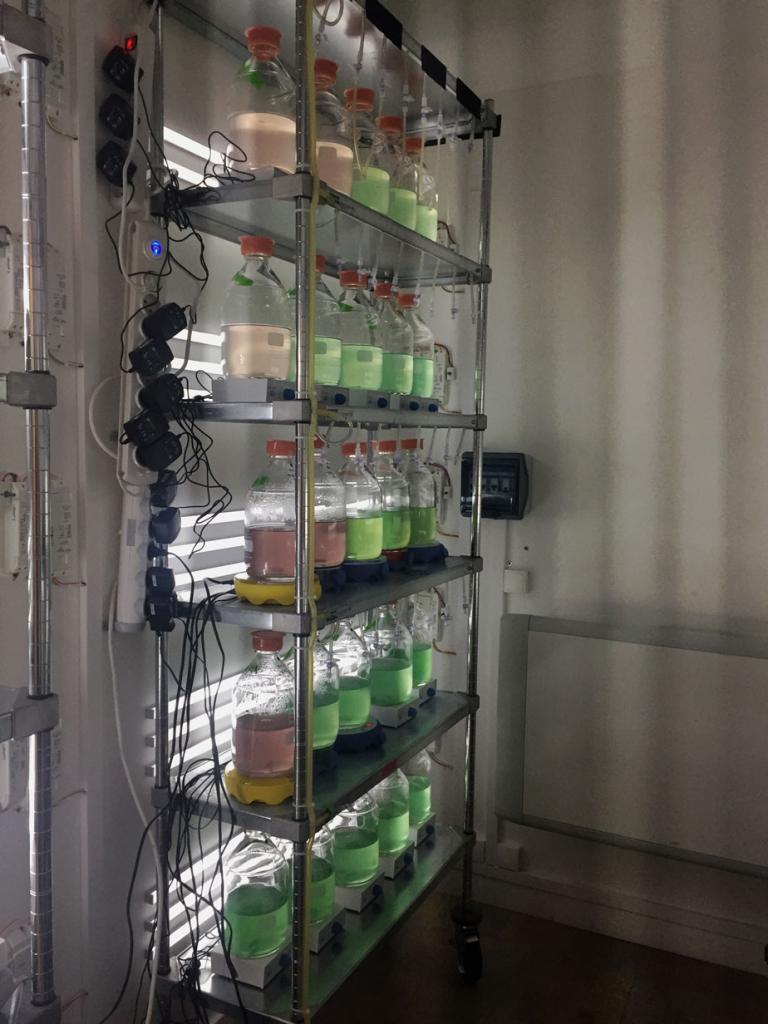The Museum’s live collections of freshwater eukaryotic microalgae and cyanobacteria comprise 833 and 747 strains respectively. They are housed in the "Communication Molecules and Adaptation of Micro-organisms" laboratory (UMR 7245 MNHN/CNRS) and maintained by the "Cyanobacteria, cyanotoxins and environment" research team.
The living collection of microalgae (ALCP), or Historical Collection, was created in the end of the 1920s by Mr Lefèvre and Pr. P. Allorge. It is the largest collection of freshwater algae in France and it is presently composed of 850 algal strains representing seven algal divisions. These are maintained in living cultures and their genomes have been sequenced.
This collection constitutes a reference library for taxonomical studies but also for experimentation in ecotoxicology. Some of the strains in the collectin are ISO references.

Collection actuelle 2 © MNHN

Collection historique © MNHN

Catalogue de la Collection Historique © MNHN
The Paris Museum Collection (PMC) of Cyanobacteria is composed of approximately 770 living strains which genomes are sequenced.
This collection is a tool for studying the taxonomic and chemical diversity of Cyanobacteria, but also to study the genes involved in the synthesis of cyanotoxins.
The strains are preserved by culture in liquid media and maintained by subculturing.
All the cultures are clonal and most of them are non axenic.

Collection de cyanobactéries vivantes PMC © Charlotte Duval

Collection de cyanobactéries vivantes PMC © Charlotte Duval

Planche de cyanobactéries © Charlotte Duval
Cyanobacteria and microalgae present in these two collections come from all over the world. They originates either from missions in the field or from other collections. The PMC collection possesses a unique group of living cyanobacteria from sub-Saharan Africa and Mayotte.
The large geographical distribution of strains from a given genus or species, allows the characterization of the genetic diversity within these taxons. On the other hand, cultures of the same species originating from the same sampling area but exhibiting different toxinic profiles, make it possible to evaluate the selective value of various toxin production strategies.
The strains from these two collections are used for educational activities; as we supply several French universities with microalgae for practical classes of botany.
The collections also constitute a reservoir of active molecules which are of industrial interest, which required the development of mass culture. The algae bank provides reference strains for normalisation tests.
Nonetheless, the main use of these collections is the support for scientific research. They are used in a wide variety of studies related to systematic, phylogeny, diversity of metabolites and toxins, ecophysiology.

Cultures en masse de cyanobactéries © Charlotte Duval
Requests for strains must be submitted via the COLHELPER portal (http://colhelper.mnhn.fr/requests?segments) on which users must create an account.
For each request, a Material Transfer Agreement (MTA / Nagoya Protocol) is established which defines the conditions of use of the material (financial, confidentiality, how to cite the strains in publications...).
The recipient agrees not to use the strains outside the conditions established in the MTA and not to redistribute the strains.
A 10 mL culture is sent to the recipient. A minimum delay of 2 weeks is required for the shipment of liquid cultures and 1 month for cryopreserved strains.
The price of a strain is 60 € H.T. a quote will be sent for the establishment of the order form mentioning: the billing address, the shipping address, the internal order number of the order form, the SIRET number, the references and the number of strains requested.
For the donation of strains, a form for the donation of natural samples for the isolation of microorganisms will be sent and must be signed by the Donor and the Museum/ donee. The samples are given to the Museum by the Donor free of charge. The Museum will have full and complete ownership of the samples.
|
Chargée de collection |
|
|---|---|
| HAMLAOUI Sahima | Researcher, CDI, MNHN |
|
Composition de l'équipe collection |
|
| BERNARD Cécile | Professor, MNHN |
|
Lecturer, MNHN |
|
|
Professor, MNHN |
|
|
Assistant Engineer, MNHN |
|
| HALARY Sébastien | Lecturer, MNHN |
|
Technical assistant, MNHN |
|
|
Engineer, MNHN |
|

